Miss Jane Marple is a fictional character in Agatha Christie's crime novels and short stories. Miss Marple lives in the village of St Mary Mead and acts as an amateur consulting detective. Often characterised as an elderly spinster, she is one of Christie's best-known characters and has been portrayed numerous times on screen. Her first appearance was in a short story published in The Royal Magazine in December 1927, "The Tuesday Night Club", which later became the first chapter of The Thirteen Problems (1932). Her first appearance in a full-length novel was in The Murder at the Vicarage in 1930, and her last appearance was in Sleeping Murder in 1976.
The Dana Girls was a series of young adult mystery novels produced by the Stratemeyer Syndicate. The title heroines, Jean and Louise Dana, are teenage sisters and amateur detectives who solve mysteries while at boarding school. The series was created in 1934 in an attempt to capitalize on the popularity of both the Nancy Drew Mystery Stories and the Hardy Boys series, but was less successful than either. The series was written by a number of ghostwriters and, despite going out-of-print twice, lasted from 1934 to 1979; the books have also been translated into a number of other languages. While subject to less critical attention than either Nancy Drew or the Hardy Boys, a number of critics have written about the series, most arguing that the Dana Girls' relative lack of success was due to the more dated nature of the series.

Memento mori is an artistic or symbolic trope acting as a reminder of the inevitability of death. The concept has its roots in the philosophers of classical antiquity and Christianity, and appeared in funerary art and architecture from the medieval period onwards.
The National Conservative Convention (NCC), is the most senior body of the Conservative Party's voluntary wing. The National Convention effectively serves as the Party's internal Parliament, and is made up of its 800 highest-ranking Party Officers.
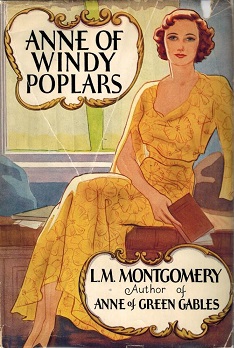
Anne of Windy Poplars—published as Anne of Windy Willows in the UK, Australia and Japan—is an epistolary novel by Canadian author L. M. Montgomery. First published in 1936 by McClelland and Stewart, it details Anne Shirley's experiences while serving as principal of a high school in Summerside, Prince Edward Island over three years. A large portion of the novel is presented through letters Anne writes to her fiancé, Gilbert Blythe. Chronologically, the book is fourth in the series, but it was the seventh book written.
Something's Afoot is a musical that spoofs detective stories, mainly the works of Agatha Christie, and especially her 1939 detective novel And Then There Were None. The book, music, and lyrics were written by James McDonald, David Vos, and Robert Gerlach, with additional music by Ed Linderman. The musical involves a group of people who are invited to the lake estate of Lord Dudley Rancour. When the wealthy lord is found dead, it is a race against the clock to find out who is the murderer.

Elephants Can Remember is a work of detective fiction by British writer Agatha Christie, first published in 1972. It features her Belgian detective Hercule Poirot and the recurring character Ariadne Oliver. This was the last novel to feature either character, although it was succeeded by Curtain: Poirot's Last Case, which had been written in the early 1940s but was published last. Elephants Can Remember concentrates on memory and oral testimony.

A Pocket Full of Rye is a work of detective fiction by Agatha Christie and first published in the UK by the Collins Crime Club on 9 November 1953, and in the US by Dodd, Mead & Co. the following year. The UK edition retailed at ten shillings and sixpence (10/6) and the US edition at $2.75. The book features her detective Miss Marple.

Jonathan Nolan is a British and American screenwriter and producer. He is the creator of the CBS science fiction series Person of Interest (2011–2016) and co-creator of the HBO science fiction/Western series Westworld (2016–2022).
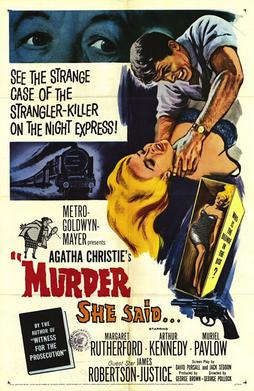
Murder She said is a 1961 comedy/murder mystery film directed by George Pollock, based on the 1957 novel 4.50 from Paddington by Agatha Christie. The production stars Margaret Rutherford as Miss Marple, along with Arthur Kennedy, Muriel Pavlow, James Robertson Justice, and Stringer Davis.
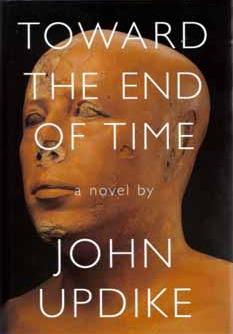
Toward the End of Time is a novel by American writer John Updike, published in 1997. It is the author's 18th novel.

An Acquaintance with Darkness is a historical fiction novel by Ann Rinaldi. It is part of the Great Episodes series. It is told in first-person narration.

My Mortal Enemy is the eighth novel by American author Willa Cather. It was first published in 1926.
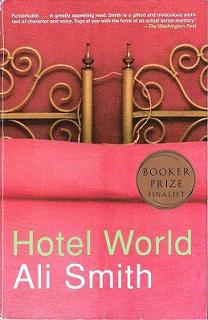
Hotel World is a 2001 novel written by Ali Smith, published by Hamish Hamilton. It won both the Scottish Arts Council Book Award (2001) and the Encore Award (2002).
Personal Call is a half-hour radio play written by Agatha Christie and first performed on the BBC Radio Light Programme on Monday, 31 May 1954. The play reuses the character of Inspector Narracott from the 1931 novel The Sittaford Mystery.
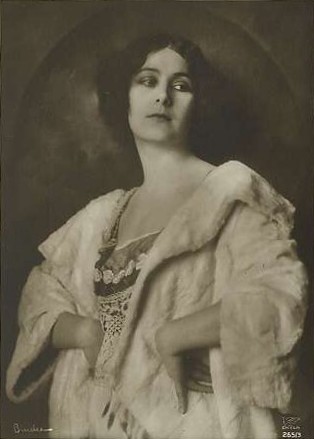
Lil Dagover was a German actress whose film career spanned between 1913 and 1979. She was one of the most popular and recognized film actresses in the Weimar Republic.

December Flower is a British single drama first broadcast at Christmas 1984.

Janet Key was an English actress with a varied career in theatre, film and television from the late 1960s until her death.

Sycamore Row is a legal thriller novel by American author John Grisham published by Doubleday on October 22, 2013. The novel reached the top spot in the US best-seller list. It is preceded by A Time to Kill and followed by A Time for Mercy.

Mrs. Palfrey at the Claremont is a novel by Elizabeth Taylor. Published in 1971, it was her eleventh novel. It was shortlisted for the 1971 Booker Prize. The novel was adapted for television in 1973 and was the basis for a 2005 film, also called Mrs. Palfrey at the Claremont.















